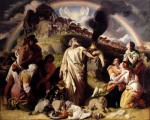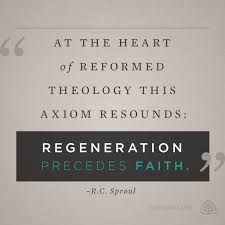Psalm 51:5 is often used to defend the idea that humans are sinners before they are born.
Behold, I was brought forth in iniquity, And in sin my mother conceived me (Psalm 51:5)
In his commentary on this text, John Calvin wrote that this proves that David was a transgressor before he ever saw the light of the world (Calvin, Calvin’s Commentaries, Psalms v2: 290).

This sort of idea is then used to prove that people are totally depraved, even from conception, not because of what they do but because depravity is part of who we are.
There are, however, several other ways of understanding this statement of David in Psalm 51:5.
Born in Sin = Learn to Sin
First, David could be saying that since he was born as a human, he learned to sin, in the same way that infants and toddlers learn to talk. It is not uncommon for the Biblical authors to speak of being “born into” something in just this way.
For example, Acts 2:8 refers to people who were born into a language, but clearly, they were not born already knowing this language, but had to learn it just like everyone else. If this is how to understand Psalm 51:5, David is saying that since he was born in sin, he learned to sin just like everyone else.
Born in Sin = Born in a Sinful World
Second, it could be argued that what David meant was that he was born into a world of sin. The phrases “in iniquity” and “in sin” would thus be understood as metonymy for “a world full of sin.” Metonymy, where a word or phrase is used in place of a different word or phrase with which it is associated, is frequently used in Scripture, and even in modern everyday speech (e.g., “the White House” is often used to refer to the President of the United States, his staff, and the decisions and policy that come from them).
So in the case of Psalm 51:5, David could be referring to the world of sin in which he was conceived and subsequently born.
Born in Sin = Poetic Exaggeration
 Third, we could simply say that Psalm 51:5 is poetic hyperbole. David is, after all, confessing his sin of committing adultery with Bathsheba, and so in the midst of this confession, he my seek to exaggerate his own sinfulness by saying that he has always been sinning, even from conception.
Third, we could simply say that Psalm 51:5 is poetic hyperbole. David is, after all, confessing his sin of committing adultery with Bathsheba, and so in the midst of this confession, he my seek to exaggerate his own sinfulness by saying that he has always been sinning, even from conception.
The Psalms are full of such exaggeration, as are the rest of Scriptures. In one place, the Psalmist writes that he drowns his bed with a single tear (Psalm 6:6; the Hebrew word for “tears” is singular), and even Paul writes that he is the chief of sinners (1 Timothy 1:15).
Even today, people often use hyperbole in exactly the same way. It is not uncommon to hear a child who misses several problems on a math test to cry out in despair, “I never get any problems right!” In reality, they get most of the problems right most of the time, and in fact, got most of the problems right on that very test. So this is a possible explanation for David’s statement as well.
Born in Sin = David’s Mother Was Accused of Adultery
One final possibility is based on a traditional Jewish reading of Psalm 69.
According to various Jewish historical writings, David’s father and brothers thought that David’s mother, Nizbeth, had committed adultery and borne him out of wedlock (See my post yesterday on David’s Mother Nizbeth for more on this).
They thought David was a bastard (the word “stranger” in Psalm 69:8 has the same Hebrew root as muzar, meaning “bastard”). The truly guilty one was David’s father, Jesse, who, as a result of having Moabite blood (from Ruth) and due to some strange twists of Jewish law, believed that his marriage to Nizbeth was illegitimate and stopped having sexual relations with her to keep her from sinning. Yet he also feared that his seven sons were illegitimate, and so he had sought to gain a legitimate heir for himself by sleeping with his wife’s maidservant (Yes, it sounds strange, but you have to understand Jewish law for it to make sense).
Anyway, Nizbeth’s maidservant loved her mistress dearly, and so switched places with her before Jesse entered her bed, much like Leah and Rachel had switched places so many years before on Jacob’s wedding night. So Jesse ended up sleeping with his wife, even though he thought it was his wife’s servant. Nizbeth became pregnant, but never told her family how she had become pregnant, because she wanted to protect Jesse from public shame. The result, however, was that Jesse, their seven sons, and the entire community came to believe that Nizbeth was an adulterer. The town urged Jesse to stone his wife for adultery, but out of love for her, he refused, and several months later, David was born.
So David grew up in a family in which he was despised, rejected, shunned, and outcast. He was treated with scorn and derision (Psalm 69:7-8). The community followed the example of the family, and assumed that David was full of sin and guilt (Psalm 69:11-12). If something turned up missing, they believed he stole it, and forced him to replace it (Psalm 69:4). He was often the object of jokes and pranks, filling his plate with gall and his cup with vinegar (Psalm 69:20-21).
There are numerous other details to this story, but the point for our purposes here is that this may be what David is referring to in Psalm 51:5. If this Jewish history is true (and we have no good reason to believe otherwise), then almost everybody—including David’s own father and brothers—believed that David was born as a result of adultery, which is why David writes, “I was brought forth in iniquity; and in sin my mother conceived me.”
What does Psalm 51:5 mean?
No matter which of the views above we adopt, the view that is most unlikely is the Calvinistic idea that David is making some sort of theological statement in Psalm 51:5 about the universal total depravity of all humans.
This sort of theologizing was not David’s intention and it does not fit the context of the chapter. There are numerous other explanations for this verse which make much better sense of the verse itself and the context as a whole.
If you want to read more about Calvinism, check out other posts in this blog series: Words of Calvinism and the Word of God.




 Through the story of the flood, the author of Genesis is telling his readers to understand that when we form our thoughts after evil instead of after God, only death and destruction follows. Noah serves as a positive example of what happens to those who follow God and faithfully obey Him, even though the entire surrounding society and context is engaging in evil continually.
Through the story of the flood, the author of Genesis is telling his readers to understand that when we form our thoughts after evil instead of after God, only death and destruction follows. Noah serves as a positive example of what happens to those who follow God and faithfully obey Him, even though the entire surrounding society and context is engaging in evil continually.

 Two key texts for the Calvinistic teaching on Total Depravity are Genesis 6:5 and Genesis 8:21. Both verses state that all the intents, thoughts, and imaginations of mankind are only evil continually. Regarding these verses, Calvinistic author Edwin Palmer says this:
Two key texts for the Calvinistic teaching on Total Depravity are Genesis 6:5 and Genesis 8:21. Both verses state that all the intents, thoughts, and imaginations of mankind are only evil continually. Regarding these verses, Calvinistic author Edwin Palmer says this:


 And a long quote from R. C. Sproul:
And a long quote from R. C. Sproul:
 Yet if faith is something good that we do, if faith is a work, why does God call people to place faith in Jesus for eternal life (John 3:16; 5:24; 6:47)? Why does God seem to hold people responsible for something which they are not able to do? The Calvinistic answer to this is that faith itself is a gift of God.
Yet if faith is something good that we do, if faith is a work, why does God call people to place faith in Jesus for eternal life (John 3:16; 5:24; 6:47)? Why does God seem to hold people responsible for something which they are not able to do? The Calvinistic answer to this is that faith itself is a gift of God.